中考英语复习语法专题--动词时态
图片预览
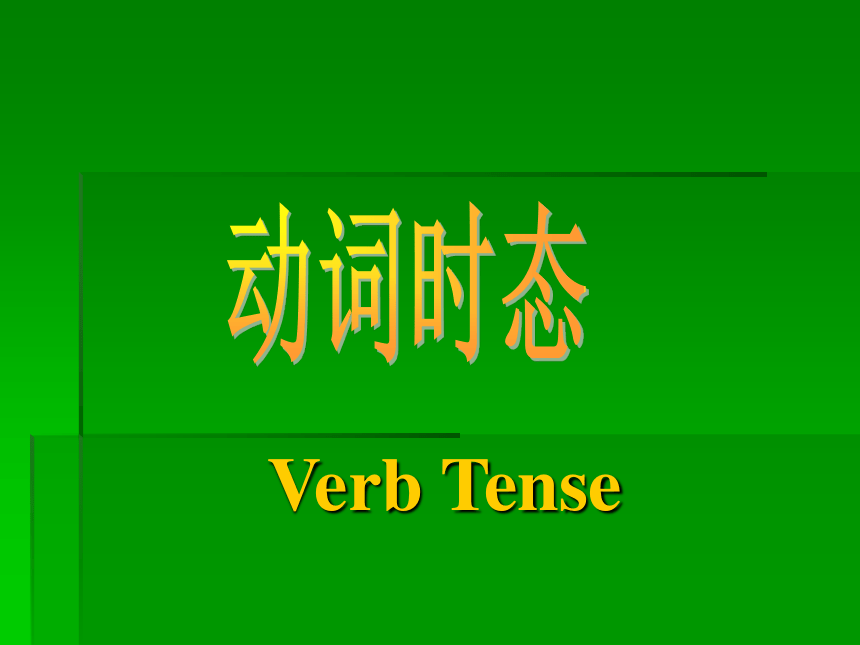
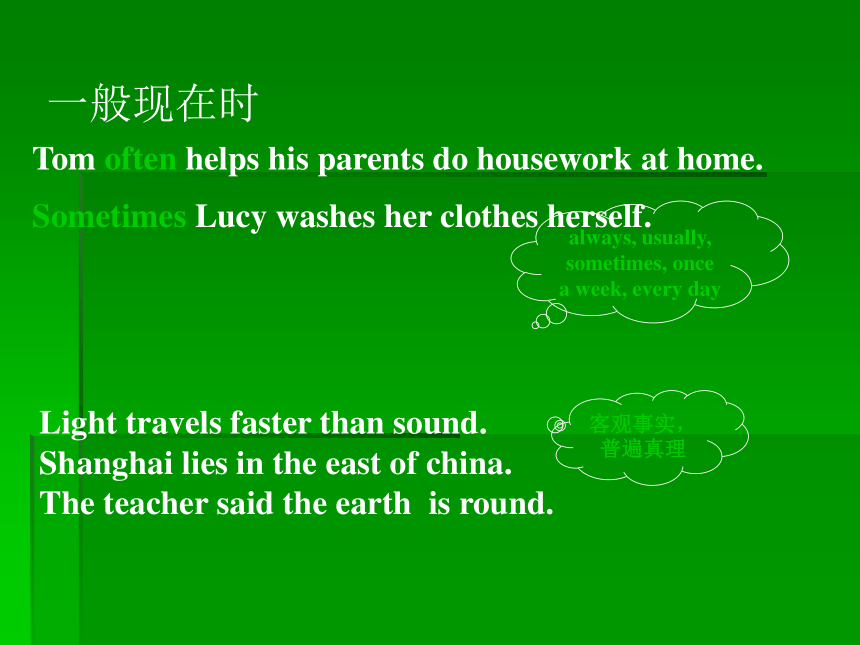
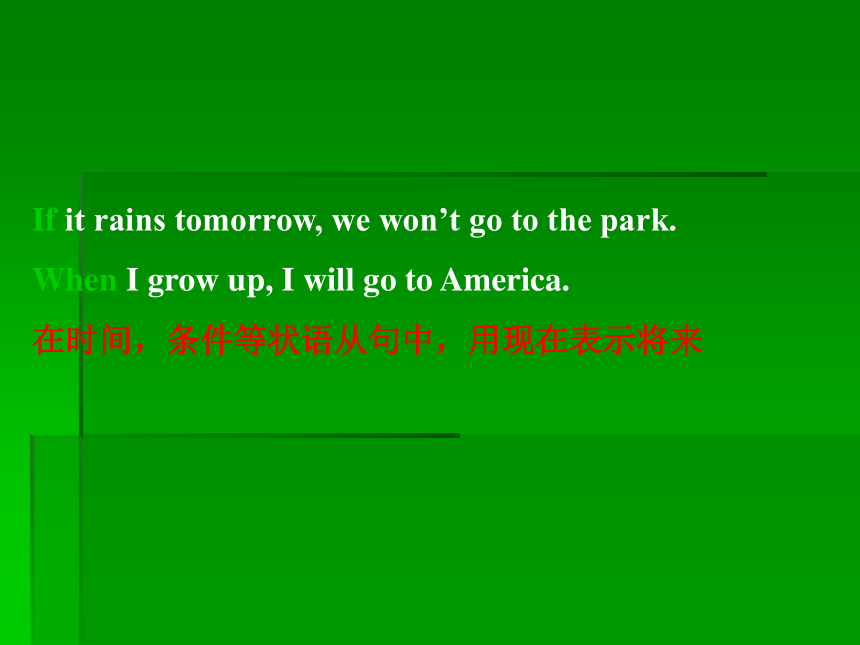
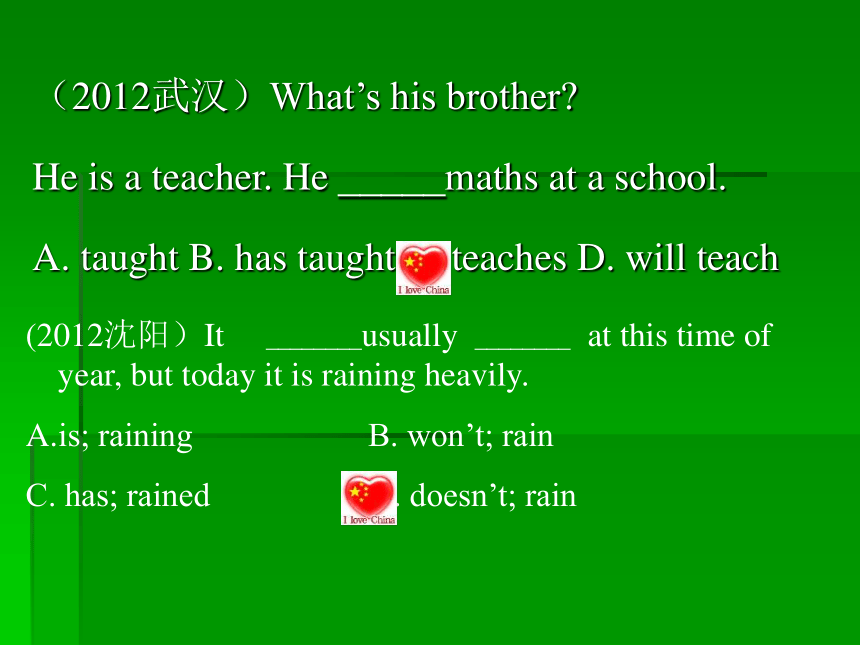
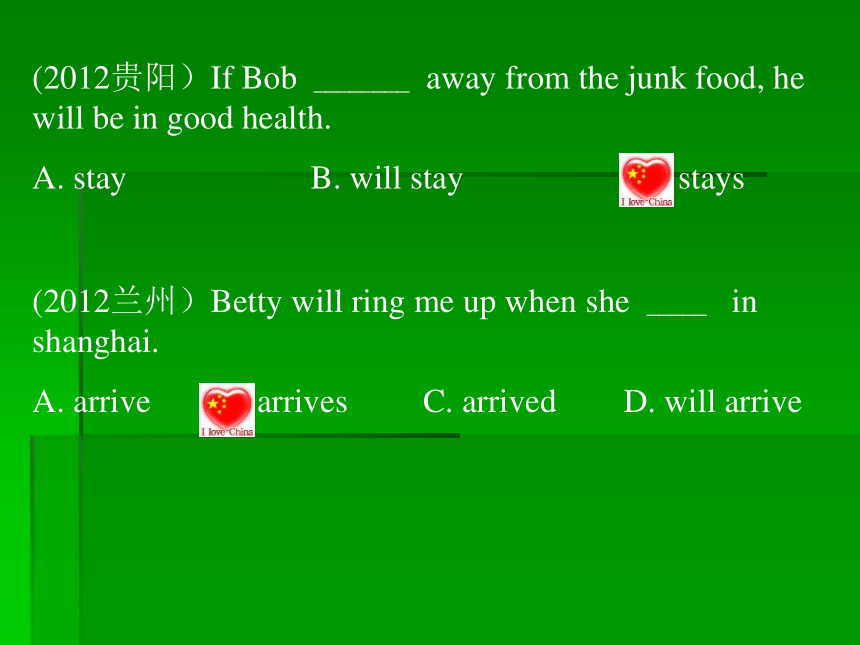
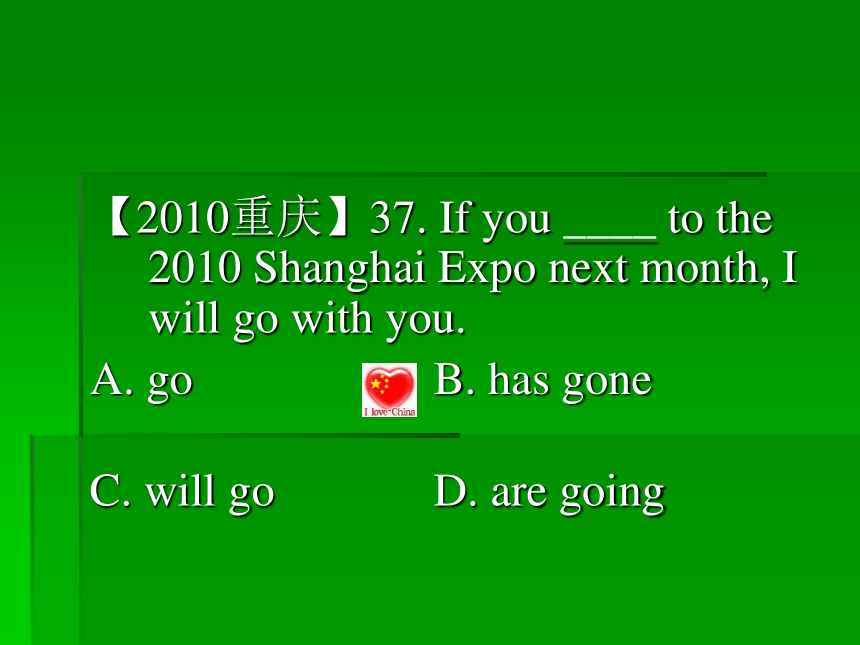
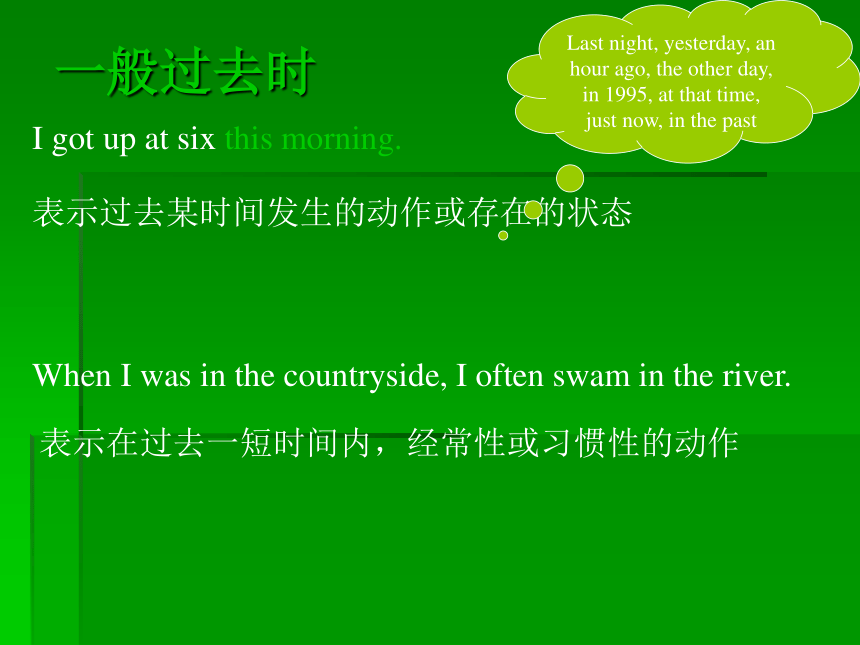
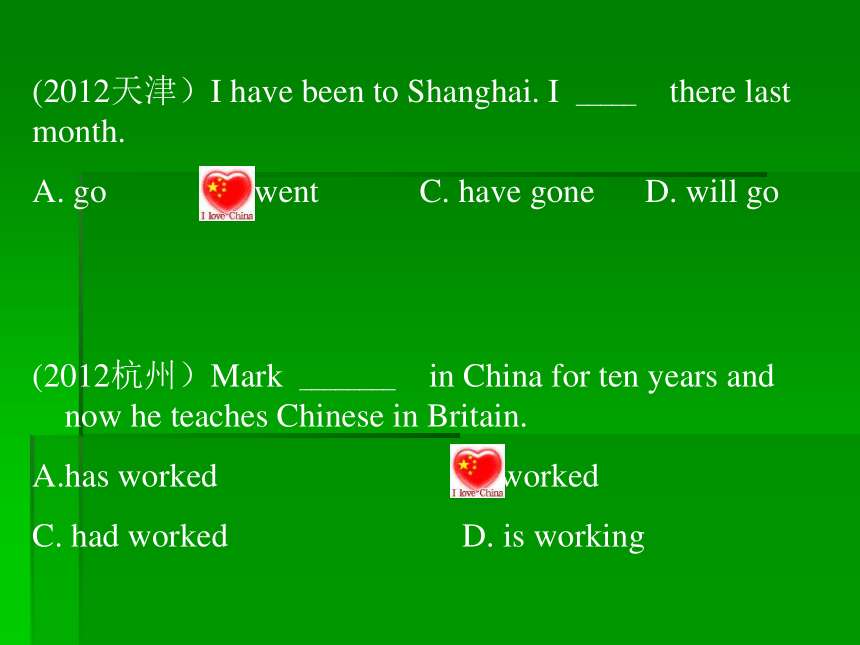
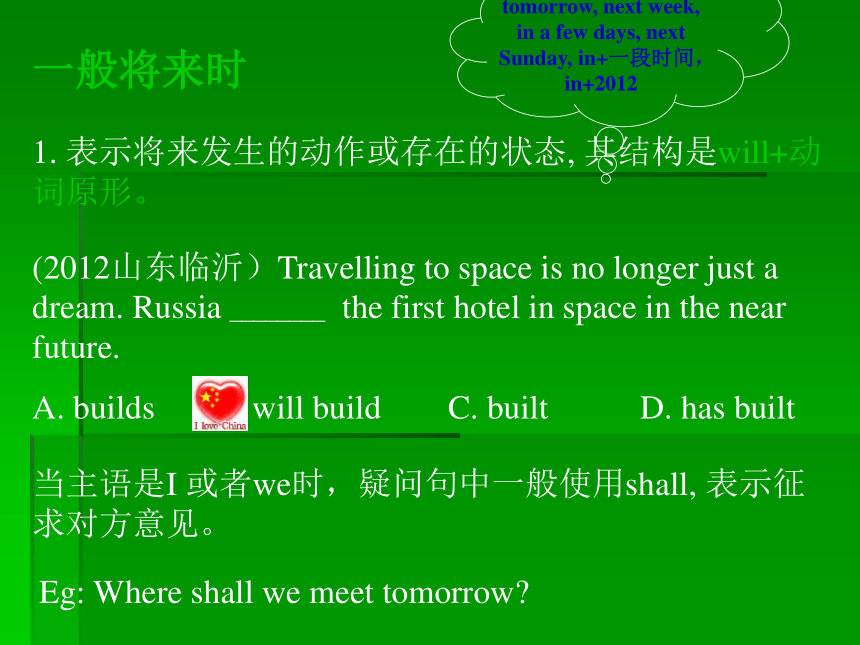
文档简介
课件23张PPT。 Verb Tense动词时态一般现在时Tom often helps his parents do housework at home.
Sometimes Lucy washes her clothes herself.
always, usually, sometimes, once a week, every dayLight travels faster than sound.
Shanghai lies in the east of china.
The teacher said the earth is round.客观事实,普遍真理If it rains tomorrow, we won’t go to the park.
When I grow up, I will go to America.
在时间,条件等状语从句中,用现在表示将来(2012武汉)What’s his brother?
He is a teacher. He _____maths at a school.
A. taught B. has taught C. teaches D. will teach(2012沈阳)It ________usually ________ at this time of year, but today it is raining heavily.
is; raining B. won’t; rain
C. has; rained D. doesn’t; rain(2012贵阳)If Bob ________ away from the junk food, he will be in good health.
A. stay B. will stay C. stays (2012兰州)Betty will ring me up when she _____ in shanghai.
A. arrive B. arrives C. arrived D. will arrive【2010重庆】37. If you ____ to the 2010 Shanghai Expo next month, I will go with you.
A. go B. has gone
C. will go D. are going一般过去时I got up at six this morning.表示过去某时间发生的动作或存在的状态Last night, yesterday, an hour ago, the other day, in 1995, at that time, just now, in the past表示在过去一短时间内,经常性或习惯性的动作When I was in the countryside, I often swam in the river.(2012天津)I have been to Shanghai. I _____ there last month.
A. go B. went C. have gone D. will go
(2012杭州)Mark ________ in China for ten years and now he teaches Chinese in Britain.
has worked B. worked
C. had worked D. is working一般将来时1. 表示将来发生的动作或存在的状态, 其结构是will+动词原形。tomorrow, next week, in a few days, next Sunday, in+一段时间,in+2012(2012山东临沂)Travelling to space is no longer just a dream. Russia ________ the first hotel in space in the near future.
A. builds B. will build C. built D. has built当主语是I 或者we时,疑问句中一般使用shall, 表示征求对方意见。Eg: Where shall we meet tomorrow?2. be going to+ 动词原形
1) 表示计划,打算做某事
Eg: What are you going to do next Sunday?
2) 表示已决定的很可能会发生的事,或有某种迹象表明要发生的事
Eg: Look at the dark clouds. There is going to be a storm.(2012安徽) Let’s discuss the plan, shall we?
Not now. I ________ to an interview.
A. go B. went C. am going D. was going3. be going表示将来,常用这种结构的动词有go, come, leave, stay, start, begin.
E.g.: We are leaving for London.
She is going there tomorrow. 现在进行时be (am /is /are) +Ving …
表示正在进行的动作。
What are you doing now?
表示即将发生的动作.
She is leaving tomorrow.
表示现阶段正在进行的动作.
More and more people are giving up smoking.
表示反复发生的或习惯性的动作,常表示不满,抱怨,赞赏等.
She is always finding fault with others.【2010宁夏】32. ---Where’s Li Hua?
---Look! He ____ tennis on the playground.
A. Plays B. played
C. was playing D. is playingwas /were+ Ving….
1. 过去某一时刻在进行的动作.经常需要表示过去的时间状语.
This time yesterday, they were having lunch.
—— What were you doing at nine last night?
—— I was watching TV at that time.
过去进行时【2010安徽省卷】47. -- Why didn't you go to the cinema with us this afternoon?
-- I ______ at the station for my uncle from Beijing.
A. was waiting B. have waited
C. am waiting D. will wait(2012广东)Jenny _______ in the kitchen when you called her at 5o’clock this afternoon.
is cooking B. was cooking
C. cooks D. cooked(2012山西)Last night, I ______ computer games when my mother came into my bedroom. You can’t imagine how embarrassed I was then.
A. played B. was playing C. have played【2010河北】44. I ________ my clothes, and the phone rang.
A. wash B. washed C. am washing D. was washing现在完成时 have/has+done
1、He has just gone out, so you can't find him now.
强调过去发生的动作对现在的影响
2、He has never been late for school.
强调动作从过去延续到现在
3、I have visited America for three times.
强调从过去到现在的经历过去+现在2.过去频繁发生的习惯性动作,常与always, often等连用.
They were frequently going there.
Alice was always changing her mind.【2010湖北咸宁】30. — Could I clean the bedroom for you?
— No, thanks. I ________ it myself.
A. cleaned B. have cleaned
C. was cleaning D. had cleaned【2010江苏镇江】10. —The Summer Palace is wonderful. Have you ever visited any other interesting places?
—Yes. Also, we _________ to the Great Wall.
have gone B. have been
C. had gone D. had been过去完成时 had+ done
1. She had borrowed a book before she went to the park.
2. We had learned many English words by the end of last term.
强调过去的某一时间(动作)之前已经发生的动作【2010甘肃兰州】39. The plane ______ when we got to the airport.
A. had taken off B. was taken off
C. will take off D. is taking off过去将来时表示在过去将来的某一时间发生的动作或存在的状态。
I didn’t expect that so many people would offer their help.
也可用was/were to+动词原形或was/were about to+动词原形或was/were going to+动词原形表示过去将来时。
I was about to leave when the telephone rang.Thank You
Sometimes Lucy washes her clothes herself.
always, usually, sometimes, once a week, every dayLight travels faster than sound.
Shanghai lies in the east of china.
The teacher said the earth is round.客观事实,普遍真理If it rains tomorrow, we won’t go to the park.
When I grow up, I will go to America.
在时间,条件等状语从句中,用现在表示将来(2012武汉)What’s his brother?
He is a teacher. He _____maths at a school.
A. taught B. has taught C. teaches D. will teach(2012沈阳)It ________usually ________ at this time of year, but today it is raining heavily.
is; raining B. won’t; rain
C. has; rained D. doesn’t; rain(2012贵阳)If Bob ________ away from the junk food, he will be in good health.
A. stay B. will stay C. stays (2012兰州)Betty will ring me up when she _____ in shanghai.
A. arrive B. arrives C. arrived D. will arrive【2010重庆】37. If you ____ to the 2010 Shanghai Expo next month, I will go with you.
A. go B. has gone
C. will go D. are going一般过去时I got up at six this morning.表示过去某时间发生的动作或存在的状态Last night, yesterday, an hour ago, the other day, in 1995, at that time, just now, in the past表示在过去一短时间内,经常性或习惯性的动作When I was in the countryside, I often swam in the river.(2012天津)I have been to Shanghai. I _____ there last month.
A. go B. went C. have gone D. will go
(2012杭州)Mark ________ in China for ten years and now he teaches Chinese in Britain.
has worked B. worked
C. had worked D. is working一般将来时1. 表示将来发生的动作或存在的状态, 其结构是will+动词原形。tomorrow, next week, in a few days, next Sunday, in+一段时间,in+2012(2012山东临沂)Travelling to space is no longer just a dream. Russia ________ the first hotel in space in the near future.
A. builds B. will build C. built D. has built当主语是I 或者we时,疑问句中一般使用shall, 表示征求对方意见。Eg: Where shall we meet tomorrow?2. be going to+ 动词原形
1) 表示计划,打算做某事
Eg: What are you going to do next Sunday?
2) 表示已决定的很可能会发生的事,或有某种迹象表明要发生的事
Eg: Look at the dark clouds. There is going to be a storm.(2012安徽) Let’s discuss the plan, shall we?
Not now. I ________ to an interview.
A. go B. went C. am going D. was going3. be going表示将来,常用这种结构的动词有go, come, leave, stay, start, begin.
E.g.: We are leaving for London.
She is going there tomorrow. 现在进行时be (am /is /are) +Ving …
表示正在进行的动作。
What are you doing now?
表示即将发生的动作.
She is leaving tomorrow.
表示现阶段正在进行的动作.
More and more people are giving up smoking.
表示反复发生的或习惯性的动作,常表示不满,抱怨,赞赏等.
She is always finding fault with others.【2010宁夏】32. ---Where’s Li Hua?
---Look! He ____ tennis on the playground.
A. Plays B. played
C. was playing D. is playingwas /were+ Ving….
1. 过去某一时刻在进行的动作.经常需要表示过去的时间状语.
This time yesterday, they were having lunch.
—— What were you doing at nine last night?
—— I was watching TV at that time.
过去进行时【2010安徽省卷】47. -- Why didn't you go to the cinema with us this afternoon?
-- I ______ at the station for my uncle from Beijing.
A. was waiting B. have waited
C. am waiting D. will wait(2012广东)Jenny _______ in the kitchen when you called her at 5o’clock this afternoon.
is cooking B. was cooking
C. cooks D. cooked(2012山西)Last night, I ______ computer games when my mother came into my bedroom. You can’t imagine how embarrassed I was then.
A. played B. was playing C. have played【2010河北】44. I ________ my clothes, and the phone rang.
A. wash B. washed C. am washing D. was washing现在完成时 have/has+done
1、He has just gone out, so you can't find him now.
强调过去发生的动作对现在的影响
2、He has never been late for school.
强调动作从过去延续到现在
3、I have visited America for three times.
强调从过去到现在的经历过去+现在2.过去频繁发生的习惯性动作,常与always, often等连用.
They were frequently going there.
Alice was always changing her mind.【2010湖北咸宁】30. — Could I clean the bedroom for you?
— No, thanks. I ________ it myself.
A. cleaned B. have cleaned
C. was cleaning D. had cleaned【2010江苏镇江】10. —The Summer Palace is wonderful. Have you ever visited any other interesting places?
—Yes. Also, we _________ to the Great Wall.
have gone B. have been
C. had gone D. had been过去完成时 had+ done
1. She had borrowed a book before she went to the park.
2. We had learned many English words by the end of last term.
强调过去的某一时间(动作)之前已经发生的动作【2010甘肃兰州】39. The plane ______ when we got to the airport.
A. had taken off B. was taken off
C. will take off D. is taking off过去将来时表示在过去将来的某一时间发生的动作或存在的状态。
I didn’t expect that so many people would offer their help.
也可用was/were to+动词原形或was/were about to+动词原形或was/were going to+动词原形表示过去将来时。
I was about to leave when the telephone rang.Thank You
同课章节目录
- 词法
- 名词
- 动词和动词短语
- 动词语态
- 动词时态
- 助动词和情态动词
- 非谓语动词
- 冠词
- 代词
- 数词和量词
- 形容词副词及其比较等级
- 介词和介词短语
- 连词和感叹词
- 构词法
- 相似、相近词比较
- 句法
- 陈述句
- 一般疑问句和否定疑问句
- 特殊疑问句及选择疑问句
- 反意疑问句
- 存在句(There be句型)
- 宾语从句
- 定语从句
- 状语从句
- 主谓一致问题
- 简单句
- 并列句
- 复合句
- 主谓一致
- 主、表语从句
- 名词性从句
- 直接引语和间接引语
- 虚拟语气
- 感叹句
- 强调句
- 倒装句
- 祈使句
- 句子的成分
- 句子的分类
- 题型专区
- 单项选择部分
- 易错题
- 完形填空
- 阅读理解
- 词汇练习
- 听说训练
- 句型转换
- 补全对话
- 短文改错
- 翻译
- 书面表达
- 任务型阅读
- 语法填空
- 其他资料
